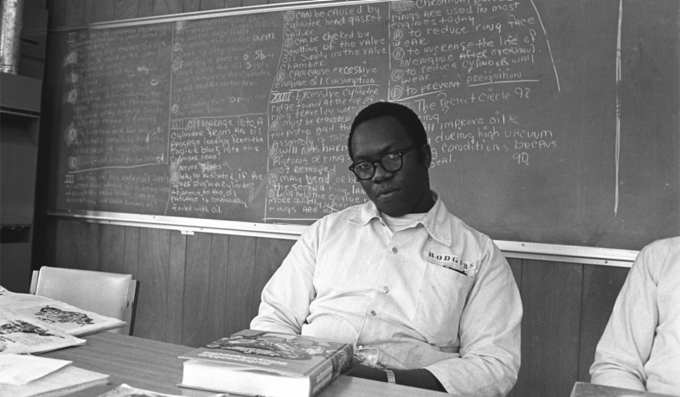College in Prison Program

Photo credit: Bruce Jackson, Cummins Unit, Arkansas Department of Corrections, 1974
Higher education in prison is a proven lever for advancing the health, well-being, and stability of justice-involved individuals. Research shows that incarcerated people who access college programs experience lower rates of depression, stronger social and cognitive skills, and a significantly lower likelihood of returning to prison. Education also fosters purpose, resilience, and future orientation, factors linked to improved mental health and greater access to economic and social supports. These effects ripple outward: families are strengthened, cycles of incarceration are disrupted, and communities benefit from returning citizens who are prepared to lead, work, and thrive. The UB College in Prison Program at the Wende Correctional Facility is rooted in this vision of individual transformation and collective well-being.
The UB College in Prison Program is accredited by the Middle States Commission on Higher Education, and approved by the U.S. Department of Education to receive Pell grants on behalf of incarcerated students. We are a member of the New York Consortium for Higher Education in Prison (NYCHEP), and one of more than a dozen SUNY campuses offering college degrees in New York State prisons.
- BA in Sociology
- Minor in Nonprofit Leadership
We are grateful to our many campus and community partners who have assisted with the development and launch of the program, in particular:
- SUNY Office for Higher Education in Prison
- New York Consortium for Higher Education in Prison (NYCHEP)
- Unlocked Labs
- JSTOR Access in Prison Initiative
- Peaceprints of WNY
- Erie Community College
- Rochester Education Justice Initiative
We are also grateful to our current and past funders:
In addition to offering the BA degree, the Department of Sociology and Criminology, and the UB College in Prison Program regularly sponsor campus and community events to highlight the voices and achievements of incarcerated and formerly incarcerated people, explore the broader implications of prison education and criminal justice reform, and invite dialogue across lines of experience and expertise.

Mary Nell Trautner, PhD
Director, UB College in Prison Program; Associate Professor
Department of Sociology and Criminology